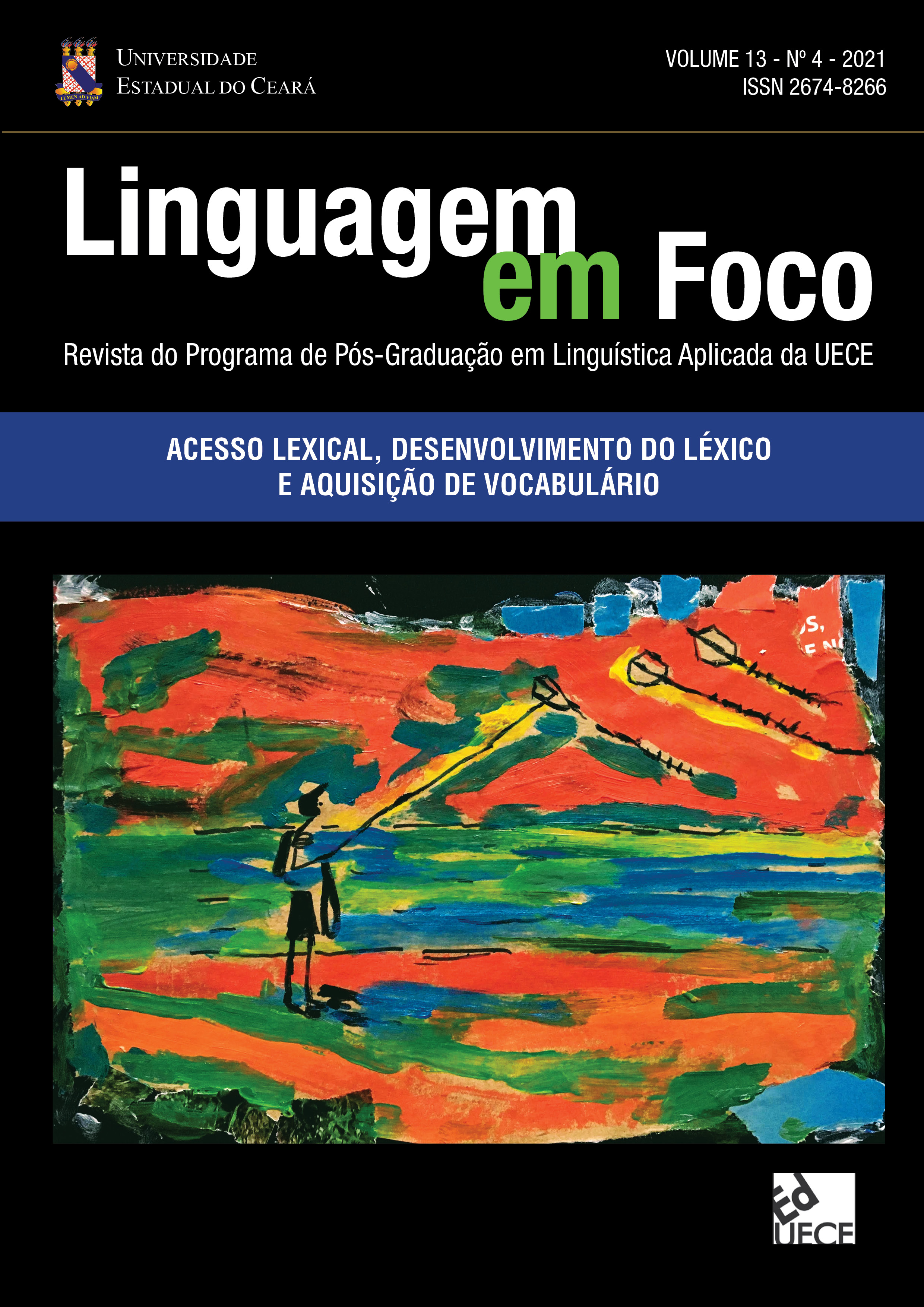Spelling-sound knowledge in the context of multilingualism
Is lexical access selective or nonselective?
DOI:
https://doi.org/10.46230/2674-8266-13-7387Palabras clave:
Writing Systems, Lexical Access, Multilingualism, Phonological PrimingResumen
The present study investigates shared phonological information and selectivity during lexical access in Brazilian Portuguese-English unbalanced bilinguals, learners of Korean as an L3. Participants took part in a word naming task which used L2 primes with targets from the L3 at stimulus onset asynchronies (SOA) of 140ms and 250ms. The results show a significant facilitation effect in word naming when an English prime was presented in comparison with control primes. Additionally, a significant facilitation effect was also seen in trials in which the primes were presented at a 250ms SOA in relation to a 140ms SOA. Taken together, the results indicate that participants’ spelling-sound knowledge of L2 English was activated during the reading aloud of words in L3 Korean, which indicates nonselectivity in lexical access and a shared mental lexicon across languages.
Descargas
Citas
BATES, D. et al. Fitting Linear Mixed-Effects Models Using lme4. Journal of Statistical Software, v. 67, n. 1, 2015.
CHOI, W.; NAM, K.; LEE, C. H. Nonselective Access of Phonological Lexicon for Two Different Orthographies: Korean and English. Perceptual and Motor Skills, v. 110, n. 3, p. 693–698, jun. 2010.
DIJKSTRA, T.; GRAINGER, J.; VAN HEUVEN, W. J. B. Recognition of Cognates and Interlingual Homographs: The Neglected Role of Phonology. Journal of Memory and Language, v. 41, n. 4, p. 496–518, nov. 1999.
DIJKSTRA, T.; VAN HEUVEN, W. J. B. The architecture of the bilingual word recognition system: From identification to decision. Bilingualism: Language and Cognition, v. 5, n. 3, p. 175–197, dez. 2002.
GRAINGER, J.; DIJKSTRA, T. On the Representation and Use of Language Information in Bilinguals. In: HARRIS, R. J. (Ed.). Cognitive Processing in Bilinguals. Advances in Psychology. North-Holland, 1992. v. 83, p. 207–220.
JOURAVLEV, O.; LUPKER, S. J.; JARED, D. Cross-language phonological activation: Evidence from masked onset priming and ERPs. Brain and Language, v. 134, p. 11–22, jul. 2014.
LEE, C. H.; NAM, K.; KATZ, L. Nonselective access of spelling–sound knowledge for Korean‐English bilinguals. International Journal of Psychology, v. 40, n. 6, p. 407–415, dez. 2005.
NAKAYAMA, M. et al. Cross-script phonological priming for Japanese-English bilinguals: Evidence for integrated phonological representations. Language and Cognitive Processes, v. 27, n. 10, p. 1563–1583, dez. 2012.
POLLATSEK, A. The Role of Sound in Silent Reading. In: The Oxford Handbook of Reading. 2015.
ROUX, F.; ARMSTRONG, B. C.; CARREIRAS, M. Chronset: An automated tool for detecting speech onset. Behavior Research Methods, v. 49, n. 5, p. 1864–1881, out. 2017.
SZUBKO-SITAREK, W. Multilingual Lexical Recognition in the Mental Lexicon of Third Language Users. Berlin, Heidelberg: Springer Berlin Heidelberg, 2015.
TOASSI, P. F. P. Investigating Lexical Access in Multilinguals: A Study on the Processing of English as L3. Tese (doutorado) - Universidade Federal de Santa Catarina, Centro de Comunicação e Expressão, Programa de Pós-Graduação em Inglês: Estudos Linguísticos e Literários, Florianópolis, 2016. Disponível em: https://repositorio.ufsc.br/xmlui/handle/123456789/171451. Acesso em: 04 mar. 2022.
TOASSI, P. F. P.; MOTA, M. B. Acesso lexical de bilíngues e multilíngues. Acta Scientiarum. Language and Culture, v. 37, n. 4, p. 393, 1 out. 2015.
VAN HEUVEN, W. J. B.; DIJKSTRA, T.; GRAINGER, J. Orthographic Neighborhood Effects in Bilingual Word Recognition. Journal of Memory and Language, v. 39, n. 3, p. 458–483, out. 1998.
Descargas
Publicado
Cómo citar
Número
Sección
Licencia
Derechos de autor 2022 Luiza de Melo Carvalho, Mailce Borges Mota, Pietra Cassol Rigatti

Esta obra está bajo una licencia internacional Creative Commons Atribución 4.0.
Os autores que publicam na Linguagem em Foco concordam com os seguintes termos:
- Os autores mantêm os direitos autorais e concedem à revista o direito de primeira publicação. Os artigos estão simultaneamente licenciados sob a Creative Commons Attribution License que permite a partilha do trabalho com reconhecimento da sua autoria e da publicação inicial nesta revista.
- Os conceitos emitidos em artigos assinados são de absoluta e exclusiva responsabilidade de seus autores. Para tanto, solicitamos uma Declaração de Direito Autoral, que deve ser submetido junto ao manuscrito como Documento Suplementar.
- Os autores têm autorização para disponibilizar a versão do texto publicada na Linguagem em Foco em repositórios institucionais ou outras plataformas de distribuição de trabalhos acadêmicos (ex. ResearchGate, Academia.edu).





























